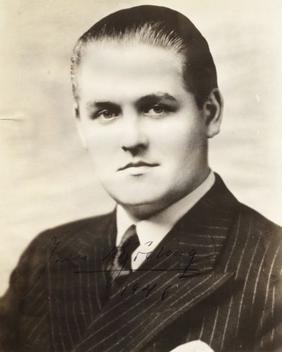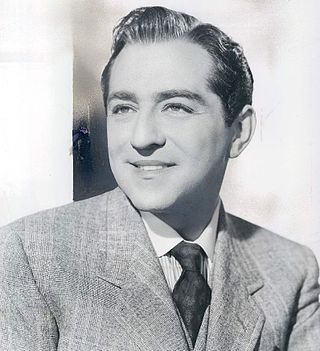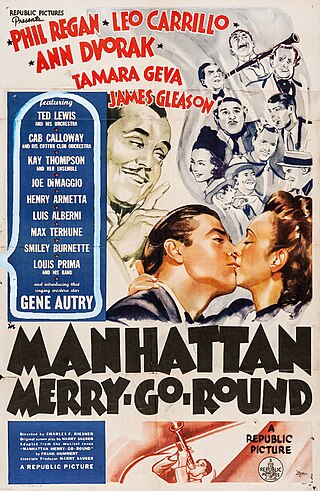
Johan Jonatan "Jussi" Björling was a Swedish tenor. One of the leading operatic singers of the 20th century, Björling appeared for many years at the Metropolitan Opera in New York City and less frequently at the major European opera houses, including the Royal Opera House in London and La Scala in Milan. He sang the Italian, French and Russian opera repertory with taste.

The NBC Symphony Orchestra was a radio orchestra conceived by David Sarnoff, the president of the Radio Corporation of America, especially for the conductor Arturo Toscanini. The NBC Symphony performed weekly radio concert broadcasts with Toscanini and other conductors and served as house orchestra for the NBC network.
The Voice of Firestone was a radio and television program of classical music. The show featured leading singers in selections from opera and operetta. Originally titled The Firestone Hour, it was first broadcast on the NBC Radio network on December 3, 1928 and was later also shown on television starting in 1949. The program was last broadcast in 1963.
The year 1940 saw a number of significant events in radio broadcasting history.

Robert Merrill was an American operatic baritone and actor, who was also active in the musical theatre circuit. He received the National Medal of Arts in 1993.

The Blue Network was the on-air name of a now defunct American radio network, which broadcast from 1927 through 1945.

Monitor was an American weekend radio program broadcast live and nationwide on the NBC Radio Network from June 12, 1955, until January 26, 1975. It began originally on Saturday morning at 8am and continued through the weekend until 12 midnight on Sunday. After the first few months, the full weekend broadcast was shortened when the midnight-to-dawn hours were dropped since few NBC stations carried it.

Ernö Rapée was a Hungarian-born American symphonic conductor in the first half of the 20th century whose prolific career spanned both classical and popular music. His most famous tenure was as the head conductor of the Radio City Symphony Orchestra, the resident orchestra of the Radio City Music Hall, whose music was also heard by millions over the air.

The Collier Hour, also known as Collier's Radio Hour, broadcast on the NBC Blue Network from 1927 to 1932, was radio's first major dramatic anthology.
The A&P Gypsies is a musical series broadcast on radio beginning in 1924. With the opening theme of "Two Guitars," the host and band leader was Harry Horlick, who had learned gypsy folk music while traveling with gypsy bands in Istanbul.

Acousticon Hour was a "musicale" radio program aired during 1927 and 1928 on NBC. It offered selections from classical music, orchestral favorites, operas and operettas.
Ford Theatre, spelled Ford Theater for the original radio version and known, in full, as The Ford Television Theatre for the TV version, is a radio and television anthology series broadcast in the United States in the 1940s and 1950s. At various times the television series appeared on all three major television networks, while the radio version was broadcast on two separate networks and on two separate coasts. Ford Theatre was named for its sponsor, the Ford Motor Company, which had an earlier success with its concert music series, The Ford Sunday Evening Hour (1934–42).

NBC University Theater was a brand the National Broadcasting Co. applied to a category of radio programming. Although not actually a university, some colleges and universities collaborated in some of the programming, either contributing to its content or including the programming in their curriculum. NBC University Theater's most well-known radio series was The World's Great Novels. NBC used the name "University Theater" or similar from about 1923–1947.

The Ford Sunday Evening Hour is an American concert radio series sponsored by the Ford Motor Company. The hour-long program was broadcast from 1934 to 1946, with a hiatus from 1942 to 1945. Later known as The Ford Symphony Hour, the program presented selections of classical music, hymns, popular ballads and well-known arias.

Manhattan Merry-Go-Round is an NBC musical variety radio program that was broadcast from November 6, 1932, until April 17, 1949. The musical revue was produced by Frank and Anne Hummert. Sponsored by Dr. Lyons Tooth Powder, the radio series was adapted by Frank Hummert and producer Harry Sauber into a 1937 musical comedy feature film for Republic Pictures.
The Standard Hour, also known as The Standard Symphony Hour, was a weekly radio broadcast by the San Francisco Symphony Orchestra and the San Francisco Opera first heard in 1926. The series was carried on the NBC Pacific radio network on Sundays at 8:30 p.m. Pacific time.
The General Electric Concert was a music series sponsored by General Electric and broadcast on the NBC Red Network beginning in 1931.
Laundryland Lyrics is a music program broadcast on NBC beginning on October 12, 1927.

The Majestic Theater of the Air, also known as The Majestic Hour, is an American musical radio program that aired on the CBS radio network between 1928 and 1932 on Sunday evenings. The series was produced and emcee'd by Wendell Hall and sponsored by Chicago's Grigsby-Grunow Company, manufacturers of Majestic Radios. It began on the CBS network in October, 1928, with a coast-to-coast hookup of 29 stations.
Hollywood Playhouse, also known as Woodbury Hollywood Playhouse, is a radio anthology drama series that featured adaptations of plays and short stories. Created as a showcase for Tyrone Power, the series began October 3, 1937, on the Blue Network, with Darryl F. Zanuck introducing his 20th Century-Fox star. The half-hour program aired Sundays at 9 p.m. ET until September 1939, when it was moved to the NBC Red Network Wednesdays at 8 pm ET. Woodbury Soap and Jergens Lotion sponsored the show.












